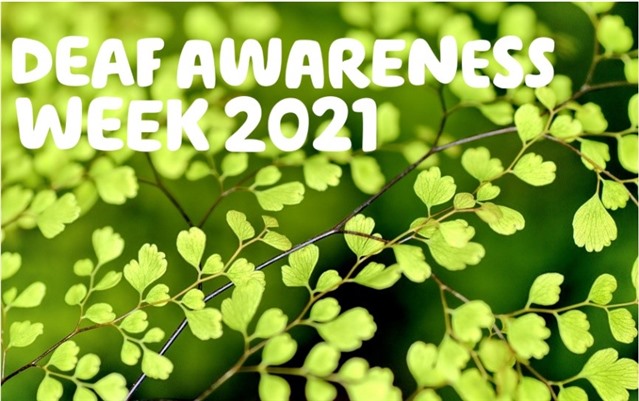
This week (3rd-9th May) marks Deaf Awareness Week 2021, a week where we raise awareness of deafness and the Deaf community as well as the support available for deaf/Deaf people.
You may wonder why I have written the word deaf with a lower-case d, as well as with an upper- case D. This is because we want to reach out to anyone affected by hearing loss, whether they are part of the Deaf community and identify as a Deaf person (Deaf), or not (deaf). The word deaf can be used to describe someone who is severely hard of hearing. With a capital D however, it is a term that is used to describe someone who is part of the Deaf community and culturally Deaf.
What is the Deaf community?
The Deaf community is a community of people who identify as Deaf and who share their culture and sense of identity based on a shared language – British Sign Language.
What is British Sign Language?
You may have heard of sign language, or seen people communicating using it. You may also have seen a video of someone signing in the corner of the screen when watching television. This person is called a Sign Language Interpreter, and they translate the spoken English into British Sign Language for deaf/Deaf people. BSL was identified as an official language in 2003. It is a visual gestural language that uses handshapes, facial expression, body language and gesture to communicate meaning.
BSL has its own grammar and structure and doesn’t depend on spoken English. Like any language and culture, BSL has its own history, literature, art and culture. For Deaf people it is their first language with English being a second or third language after BSL.
Not all deaf people identify as being part of the Deaf community
Not everyone who is deaf or is affected by hearing loss identifies with Deaf culture. Identifying with Deaf culture is personal, and some people who are affected by hearing loss will feel comfortable to be fully emerged in Deaf culture and the Deaf community, while others may not be. Some people who are deaf may not communicate using BSL and prefer other methods of communication. As with any language and culture, it’s important to check with someone what their first language and culture is, instead of assuming.
Finding cancer information when you are deaf/Deaf
Many people assume that if someone is deaf, then they will be able to read written information. But for many this is not the case. For Deaf sign language users, English is a second language. While some sign language users may be able to read written English, like any second language, it can sometimes be more difficult to read information not in your preferred language.
This is why British Sign Language videos are very important as they provide information and support to Deaf/ deaf people who use sign language. Here at Macmillan we are committed to providing support to anyone affected by cancer and have a wide range of BSL videos available on our YouTube channel. Click here to see a full range of our BSL videos.
We’ve created videos on everything from common cancer symptoms to radiotherapy and healthy eating, and we are planning to make more.
These videos are in full BSL and are developed with a specialist agency. All new BSL videos are tested with BSL users as part of the production process.
Finding information on supporting your health and wellbeing in British Sign Language
Sign Health is a Deaf-led organisation and registered charity that helps support Deaf people’s health and wellbeing. They have a Health video library where you can find BSL videos that provide important information on supporting your mental health as well as your physical health.
How else can Macmillan provide support for deaf/Deaf people?
As well as our BSL videos Macmillan offers support for deaf/Deaf people on our Support Line. Our Macmillan Support Line is a source of support for anyone affected by cancer. On our Support Line you can connect with our Macmillan specialist teams. These include our Money and Work team as well as our Cancer Information nurses.
If you are deaf/Deaf or hard of hearing you can access the Support Line using the below methods:
Support via webchat from other organisations
If you are comfortable to use online webchats, many charities and organisations now offer support via webchat. This is often a way for people to access the same information and support that is provided on their telephone support lines. Below are some organisations that provide support via webchat.
Below are some other amazing organisations that provide support to deaf/Deaf people
Everyone should have the support they deserve when they face cancer. Here at Macmillan our aim is to do whatever it takes to support people affected by cancer. If you have any questions about our BSL videos, or any of the above information, please don’t hesitate to reach out to us on the Community team by emailing community@macmillan.org.uk.
Whatever cancer throws your way, we’re right there with you.
We’re here to provide physical, financial and emotional support.
© Macmillan Cancer Support 2026 © Macmillan Cancer Support, registered charity in England and Wales (261017), Scotland (SC039907) and the Isle of Man (604). Also operating in Northern Ireland. A company limited by guarantee, registered in England and Wales company number 2400969. Isle of Man company number 4694F. Registered office: 3rd Floor, Bronze Building, The Forge, 105 Sumner Street, London, SE1 9HZ. VAT no: 668265007